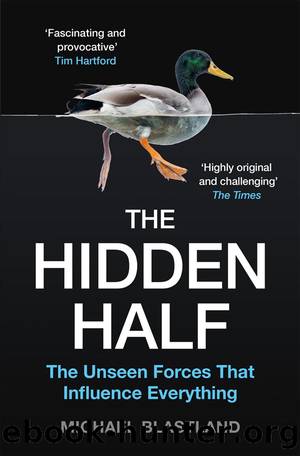The Hidden Half: How the World Conceals its Secrets by Michael Blastland

Author:Michael Blastland [Blastland, Michael]
Language: eng
Format: epub
Publisher: Atlantic Books
Published: 2019-04-04T00:00:00+00:00
Incoherence
The issue we are looking at is how well principle or theory gives us usable knowledge. The complaint that social science in particular fails to do this too often is not new. There is a large body of scepticism about the utility of the social science knowledge base, often from people working within its various disciplines. Insults include one from an economist that economics âpositively extols esoteric irrelevanceâ, another that management theory is bedevilled by âobfuscation, jargon and faddishnessâ, or that marketingâs knowledge base is âmore marsh than bedrockâ. One book belittles social science as âsorceryâ, another says âin the social sciences, little is known or predictable that is deeper than triviality or different from common sense knowledgeâ, another that âthe ruling emperor of social sciences has no clothesâ. And on it goes. A recurrent complaint especially relevant to us is that thereâs a paucity of empirical generalizations â âan empirical literature consisting almost entirely of unverified, fragile results whose role in the development of cumulative knowledge is of the shakiest kindâ.6
Thatâs a flavour of the bad press. On the acclaimed side â and it deserves to be â you could, for example, place a host of Victorian social reformers â pioneers of social science in their observational studies of living and working conditions, such as Charles Booth, Edwin Chadwick and Joseph Rowntree â who chronicled poverty, poor housing and other social conditions, and contributed to an epoch of social reform.
Duncan Watts, a social scientist, formerly an academic now principal researcher for Microsoft, has heard it all before, but wonders if itâs time the complaints were taken more seriously. On one hand, he defends social science from detractors who expect it simply to solve societyâs deepest problems. The questions it tackles are immensely tough, he says, and itâs not through laziness or stupidity that answers are hard to come by. On the other hand, as he wrote in an influential article, social science could be a lot more âvisibly useful to the worldâ.7
In an interview with me he offered an example of how social science fails: the story of his current boss, Satya Nadella, the CEO of Microsoft. When Satya Nadella decided on a corporate reorganization, Duncan said, he would have found that social science had an immense amount to say, but almost none of it was useful.
We have a very extensive literature on management science and organisation science that goes back maybe a hundred years. And thereâs thousands and thousands and thousands of papers that are published in these disciplines. And you might think that if you were going to do something like that [restructure Microsoft], you would want to go and read a discipline called âOrganisation Scienceâ. Surely, organisation science would tell you how to make your organisation more efficient.
But you would be wrong about that. And if Satya Nadella had gone and read a hundred papers in this field, he probably would have learned nothing that would have helped him answer his question and he probably would have just gotten really, really confused and, you know, possibly incapacitated.
Download
This site does not store any files on its server. We only index and link to content provided by other sites. Please contact the content providers to delete copyright contents if any and email us, we'll remove relevant links or contents immediately.
International Integration of the Brazilian Economy by Elias C. Grivoyannis(57294)
The Radium Girls by Kate Moore(10903)
Turbulence by E. J. Noyes(7033)
Nudge - Improving Decisions about Health, Wealth, and Happiness by Thaler Sunstein(6629)
The Black Swan by Nassim Nicholas Taleb(6184)
Pioneering Portfolio Management by David F. Swensen(5600)
Rich Dad Poor Dad by Robert T. Kiyosaki(5140)
Zero to One by Peter Thiel(4818)
Man-made Catastrophes and Risk Information Concealment by Dmitry Chernov & Didier Sornette(4731)
Secrecy World by Jake Bernstein(3774)
Millionaire: The Philanderer, Gambler, and Duelist Who Invented Modern Finance by Janet Gleeson(3566)
Skin in the Game by Nassim Nicholas Taleb(3456)
The Age of Surveillance Capitalism by Shoshana Zuboff(3413)
The Money Culture by Michael Lewis(3278)
Skin in the Game: Hidden Asymmetries in Daily Life by Nassim Nicholas Taleb(3259)
Bullshit Jobs by David Graeber(3173)
The Dhandho Investor by Mohnish Pabrai(3162)
The Wisdom of Finance by Mihir Desai(3070)
Blockchain Basics by Daniel Drescher(2884)
